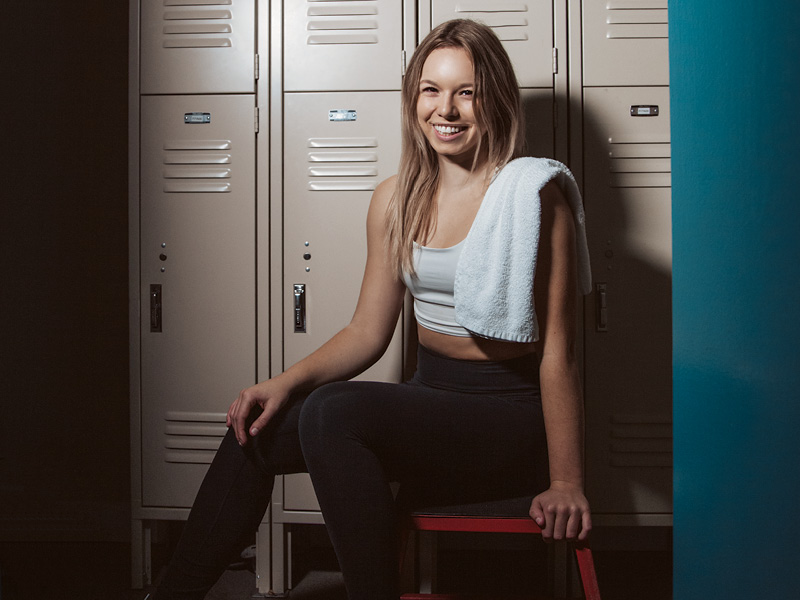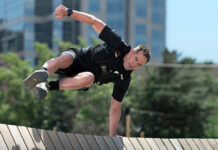Elite athletes live with the stress, body wear and tear, emotional demands of the psyche and pressure to live a healthful lifestyle every day. A competitive synchronized swimmer at the provincial level from the age of eight to seventeen, Jessica Ferris championed three times in duet and solo events. At 15, she and her duet partner were invited to MASY (Manitoba/Alberta/Saskatchewan/Yukon) where they placed fifth. Ferris was dedicated to her passion while simultaneously heading (unknowingly) towards a major breakdown unless some major changes were implemented into her eating patterns.
Currently embracing her graduate year at University of British Columbia to finish her degree with a major in International Relations, the vegetarian and fitness guru no longer competes on the elite UBC synchronized team, which once demanded 20+ hours per week training and competitions at both the regional and national levels. Today you can follow Jess on Instagram (@jess_progress) where she has created quite a following and has empowered many people with workout videos, wellness tips, and recipes. She uses Instagram to not only help others, but as a tool to help her overcome her previous eating disorder.
“My lowest point in life,” shares Jessica, “was when my swim coach recommended that I be taken to my family doctor. I knew that they would weigh me, so to make sure I wasn’t too low, I drank gallons of water just before.” Prior to this (and for many years leading up to this pivotal moment) she had been struggling with her body image. Like so many teens (male and female) looking a certain way affects so many aspects of life – eating styles being just one; confidence and self-image a couple more. Jessica chose to be a vegetarian to try to eliminate fats and starches from her diet. She traded in her eye glasses for contacts and had Invisalign installed. As her body reduced in size, she began to feel more confident. The results were promising.

“I recall being in the girls change room and one of the more popular girls came over while I was changing and began to shower me with praise for how small I was … I thought I was living a dream.” Jessica insisted that being a vegetarian then meant that her “only options were fruits and veggies.” She admits that she did not properly research a healthy vegetarian diet and quickly became stricken with anemia. The combination of low iron and proteins topped by the physical demands of intense workouts, started to take its toll. Jessica’s stress levels grew and her body started to wane from the demands.
When her family insisted Jessica attend a meeting with their family doctor, she quickly realized research was imperative if she was going to continue down a healthy vegetarian road. She agreed to work with her doctor, who set her up on a program and, on the side, did her own research. She admits “that first year of being vegetarian was one of the hardest years … I had no idea what my body truly needed and gave myself zero guidelines. I was spiralling.” With the high demands of competitive syncro behind her and an engrained pattern of frequent workouts, Jessica took to the gym.
Those who have encountered and prevailed over eating disorders will relate to how difficult contending with body image dysmorphia can be. Working with a team of medical specialists is often the only way to effectively rebuild thinking patterns as family is quite often unsuccessful, despite their infinite love and support.
Jessica attests that once she educated herself and surrounded herself with the right choices, the lifestyle has brought her to the point where she now feels the best she’s ever felt:
“I’m really proud how far I’ve come. I grew out of old dietary patterns and into new ones. My main focus now is on protein; I have learned to love carbs and I’m learning more about good fats and how beneficial they are, and I am not skipping meals anymore.
“As much as this has been difficult for me, without it I would not have been able to grow.”
– Jessica Ferris
“Although I still have challenging days, I have grown immensely. As much as this has been difficult for me, without it I would not have been able to grow. This experience helped shaped my health and sparked my interest in fitness. It got me to start my own fitness Instagram, which has only helped further my recovery. I even started a fitness challenge board.
Mental illnesses can be tough, especially when you think you are battling it alone, but I hope that my openness with what I’ve been through and my newly found positivity on life can help those who are struggling to show that yes, one day you will get through this, and you will be ok.”
















